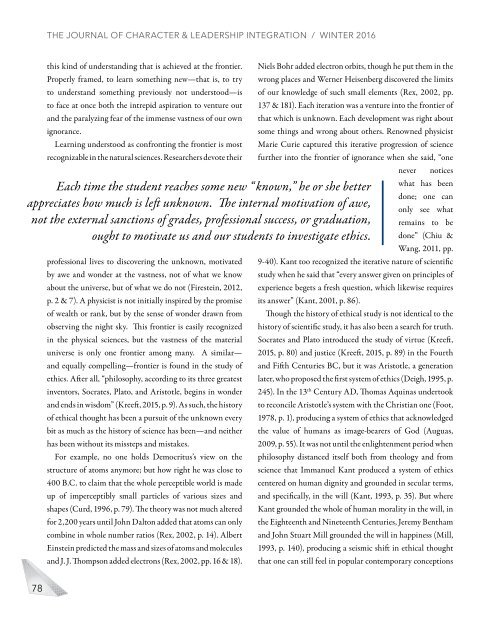PROFESSION OF ARMS
Yi5mwL
Yi5mwL
Create successful ePaper yourself
Turn your PDF publications into a flip-book with our unique Google optimized e-Paper software.
THE JOURNAL <strong>OF</strong> CHARACTER & LEADERSHIP INTEGRATION / WINTER 2016<br />
this kind of understanding that is achieved at the frontier.<br />
Properly framed, to learn something new—that is, to try<br />
to understand something previously not understood—is<br />
to face at once both the intrepid aspiration to venture out<br />
and the paralyzing fear of the immense vastness of our own<br />
ignorance.<br />
Learning understood as confronting the frontier is most<br />
recognizable in the natural sciences. Researchers devote their<br />
professional lives to discovering the unknown, motivated<br />
by awe and wonder at the vastness, not of what we know<br />
about the universe, but of what we do not (Firestein, 2012,<br />
p. 2 & 7). A physicist is not initially inspired by the promise<br />
of wealth or rank, but by the sense of wonder drawn from<br />
observing the night sky. This frontier is easily recognized<br />
in the physical sciences, but the vastness of the material<br />
universe is only one frontier among many. A similar—<br />
and equally compelling—frontier is found in the study of<br />
ethics. After all, “philosophy, according to its three greatest<br />
inventors, Socrates, Plato, and Aristotle, begins in wonder<br />
and ends in wisdom” (Kreeft, 2015, p. 9). As such, the history<br />
of ethical thought has been a pursuit of the unknown every<br />
bit as much as the history of science has been—and neither<br />
has been without its missteps and mistakes.<br />
For example, no one holds Democritus’s view on the<br />
structure of atoms anymore; but how right he was close to<br />
400 B.C. to claim that the whole perceptible world is made<br />
up of imperceptibly small particles of various sizes and<br />
shapes (Curd, 1996, p. 79). The theory was not much altered<br />
for 2,200 years until John Dalton added that atoms can only<br />
combine in whole number ratios (Rex, 2002, p. 14). Albert<br />
Einstein predicted the mass and sizes of atoms and molecules<br />
and J. J. Thompson added electrons (Rex, 2002, pp. 16 & 18).<br />
Niels Bohr added electron orbits, though he put them in the<br />
wrong places and Werner Heisenberg discovered the limits<br />
of our knowledge of such small elements (Rex, 2002, pp.<br />
137 & 181). Each iteration was a venture into the frontier of<br />
that which is unknown. Each development was right about<br />
some things and wrong about others. Renowned physicist<br />
Marie Curie captured this iterative progression of science<br />
further into the frontier of ignorance when she said, “one<br />
never notices<br />
what has been<br />
done; one can<br />
only see what<br />
remains to be<br />
done” (Chiu &<br />
Wang, 2011, pp.<br />
9-40). Kant too recognized the iterative nature of scientific<br />
study when he said that “every answer given on principles of<br />
experience begets a fresh question, which likewise requires<br />
its answer” (Kant, 2001, p. 86).<br />
Though the history of ethical study is not identical to the<br />
history of scientific study, it has also been a search for truth.<br />
Socrates and Plato introduced the study of virtue (Kreeft,<br />
2015, p. 80) and justice (Kreeft, 2015, p. 89) in the Fourth<br />
and Fifth Centuries BC, but it was Aristotle, a generation<br />
later, who proposed the first system of ethics (Deigh, 1995, p.<br />
245). In the 13 th Century AD, Thomas Aquinas undertook<br />
to reconcile Aristotle’s system with the Christian one (Foot,<br />
1978, p. 1), producing a system of ethics that acknowledged<br />
the value of humans as image-bearers of God (Auguas,<br />
2009, p. 55). It was not until the enlightenment period when<br />
philosophy distanced itself both from theology and from<br />
science that Immanuel Kant produced a system of ethics<br />
centered on human dignity and grounded in secular terms,<br />
and specifically, in the will (Kant, 1993, p. 35). But where<br />
Kant grounded the whole of human morality in the will, in<br />
the Eighteenth and Nineteenth Centuries, Jeremy Bentham<br />
and John Stuart Mill grounded the will in happiness (Mill,<br />
1993, p. 140), producing a seismic shift in ethical thought<br />
that one can still feel in popular contemporary conceptions<br />
Each time the student reaches some new “ known,” he or she better<br />
appreciates how much is left unknown. The internal motivation of awe,<br />
not the external sanctions of grades, professional success, or graduation,<br />
ought to motivate us and our students to investigate ethics.<br />
78


